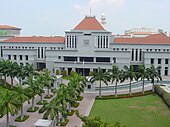This article possibly contains original research. (February 2016) |
The Pawnbrokers Act 2015 is a statute of the Parliament of Singapore that relates to pawnbrokers. The 2015 Act repeals and re-enacts the Pawnbrokers Act (Chapter 222 of the 1994 Revised Edition) and also makes consequential amendments to certain other written laws.
| Pawnbrokers Act 2015 | |
|---|---|
 | |
| Parliament of Singapore | |
| |
| Enacted by | Parliament of Singapore |
| Enacted | 19 January 2015 |
| Assented to | 16 February 2015 |
| Commenced | 1 April 2015 |
| Repeals | |
| Pawnbrokers Act 1994 | |
| Status: In force | |
Overview
editUnder the old Pawnbrokers Act of 1994, unredeemed pawned items would be put up for auction by pawnbrokers. Should the auction sale price be higher than the item's valuation, the excess went to the person that pawned the item. The new Pawnbrokers Act repeals the 1994 edition, requiring pawnbrokers to maintain a minimum paid-up capital of S$2 million for each first branch, and S$1 million for each subsequent branch. A higher security deposit is required with every branch,[1] up from S$20,000.[2]
Other steps expected include prevention of money laundering such as conducting stricter checks on their customers and reporting suspicious transactions to the police. This comes after a two-year national risk assessment by the Ministry of Home Affairs (Singapore), Ministry of Finance (Singapore) and the Monetary Authority of Singapore (MAS).[3]
Uses of the Act
editThis section needs expansion. You can help by adding to it. (February 2016) |
See also
editReferences
edit- ^ "Parliament: New pawnbroking laws prompt concerns of low valuations". Straits Times. 22 Jan 2015. Retrieved 14 March 2016.
- ^ "Parliament: Competition among pawn shops an "effective check" against low valuations". Retrieved 14 March 2016.
- ^ Yahya, Yasmine. "Straits Times: 'Robust' regime here again dirty money". Ministry of Foreign Affairs Singapore. Retrieved 14 March 2016.